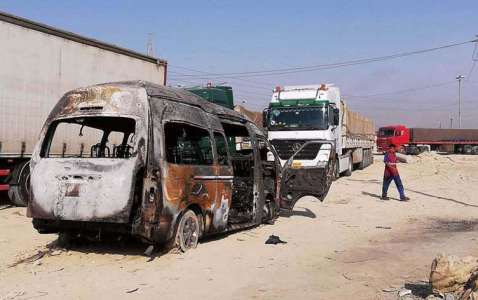
Iraqi forces arrest ISIS suspect behind Karbala bombing
Iraqi officials have confirmed the arrest of a suspected attacker after the Islamic State group (ISIS) claimed responsibility for Friday’s bombing at a checkpoint south of Iraq’s holy shrine city of Karbala, which killed 12 and wounded five.
Iraq’s Shiite community is preparing for the holy day of Arbaeen next month, when thousands of religious pilgrims are expected to visit the holy cities of Karbala and Najaf. The majority of visitors come from Iran and Afghanistan.
More than 11,800,000 people visited Karbala during Arbaeen in 2018, according to official figures.
Karbala is 85 km southwest of Baghdad.
Remnants of the Sunni jihadist terror group ISIS have long targeted Shiite Iraqis and pilgrims. The group claimed responsibility for the Kabala attack on messaging app Telegram on Saturday.
The explosive device that was detonated near Karbala’s checkpoint 54 on Friday evening was attached to a bus carrying civilians.
Mohammed al-Halbousi, Iraq’s Sunni parliamentary speaker, issued a statement condemning the bombing and accused Iraq’s military intelligence of failing to prevent the attack.
“The Iraqi military intelligence is the one to be blamed for the frequent attacks in Iraq, which each time result in civilian casualties,” he said.
In a Sunday morning press briefing, Saad Maan, spokesman for Iraq’s interior ministry, confirmed authorities had made an arrest.
Ali al-Hamdani, a senior commander of Iraq’s Popular Mobilization Forces (PMF), also known as Hashd al-Shaabi in Arabic, said Saturday an ISIS militant has been arrested in connection with the attack. The suspect has not been named.
“The Iraqi security forces have arrested the perpetrator of the attack on checkpoint 54 near Karbala city,” Hamdani said. “The terrorist is involved in two other terrorist attacks in Iraq.”
The PMF has stepped up security measures and operations ahead of Arbaeen.
It joined Iraqi security forces, coalition jets, and the Sunni tribal fighters of Hashd al-Ashairy in the fifth phase of the “Will of Victory” military operation last week to clear ISIS remnants from a 32,467 sq km area of desert around Karbala, Najaf, and Anbar.
ISIS seized vast areas of northern Iraq in 2014. The PMF was created following a fatwa – or religious call for action – from Iraq’s highest Shiite authority, Ayatollah Ali al-Sistani, to resist the jihadist march on Baghdad.
Iraq declared the territorial defeat of ISIS in December 2017 after a combined force of Iraqi troops, PMF militiamen, Kurdish Peshmerga, and Western airpower dislodged the group from its urban strongholds.
ISIS has seen a resurgence in several disputed areas of the country, however, resuming its earlier tactics of bombing, kidnap, extortion, and ambush.
Isolated rural communities have suffered the brunt of these attacks. Iraqi cities, including the capital Baghdad, meanwhile have seen an unprecedented fall in violence.
The Iraqi government of Prime Minister Adil Abdul-Mahdi has been trying to integrate the PMF into Iraq’s security apparatus following concerns the pro-Iran Shiite militias could drag Iraq into a proxy war between Iran and the US.
Arbaeen, meaning 40, is a holy day for Shiites. It marks the 40th day after the killing of Imam Hussain, grandson of the Prophet Mohammed. He was killed in battle by rival Islamic forces around the site of present day Karbala.
Source: Rudaw





